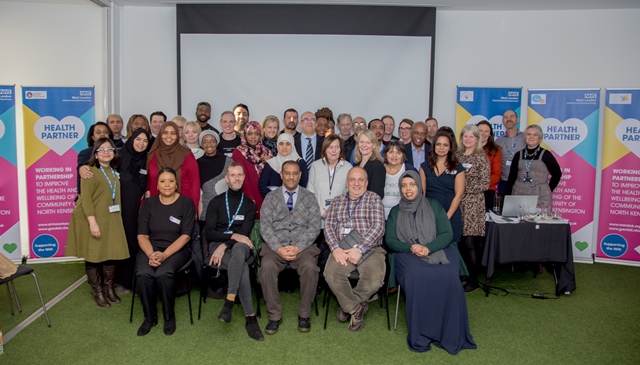Meet our Health Partners
Residents Associations, and voluntary and community and faith organisations from North Kensington are joining forces with the NHS in a new Health Partners programme to work together to improve the health and wellbeing of local residents and build the resilience of the community as a whole.
- Al-Hasinya Moroccan Women’s Centre
Website - www.al-hasaniya.org.uk - Al-Manaar Muslim Cultural Heritage Centre
Website - almanaar.org.uk - Bay 20 Community Space
Website - www.bay20.org - Baraka Community Association
Website - https://barakacommunityassociation.org/ - Dalgarno Trust
Website - www.dalgarnotrust.org.uk - French African Welfare Association
Website - www.fawauk.org - Grenfell Tower Trust
Website - grenfelltowertrust.org - Hear Women
Website - www.hearwomen.org - Volunteer Centre Kensington and Chelsea
Website - www.voluntarywork.org.uk - Lancaster West Residents Associations
Website - www.lancwest.com - Latimer Community Art Therapy
Website - www.lcat.org.uk - NeoHealth
Website - www.neohealthpcn.nhs.uk - Rugby Portobello Trust
Website - www.rugbyportobello.org.uk - Youth Action Alliance |
- Website - https://www.youthactionalliance.org
- Women’s Association for Network and Development (WAND UK)
Website - www.wanduk.org
Read more about our work through our case studies...
Al-Manaar: Our role in addressing vaccine hesitancy
The Al-Manaar Cultural Centre played a crucial role in supporting the NHS during lockdown, to encourage 1,000 members of their community to take the Covid vaccine. Abdurahman Sayed, the centre’s chief executive, explains why this partnership mattered
During the Covid pandemic there were a lot of conspiracy theories about the virus and vaccine, which was causing a high level of concern in the North Kensington community. This was a community that was already struggling with the after effects of the Grenfell Tower fire disaster in 2017. There was a real sense of distrust in the community towards any ‘official’ communication, whether that be from Government sources or even information derived from other sources.
This is where Health Partners such as the Al-Manaar Cultural Centre played such a vital role; listening and responding to community concerns in a culturally appropriate manner and making sure their communities received the correct health advice, but were not pressurised into making a decision either way.
If individuals decided to proceed with the vaccine, Al-Manaar signposted them to local NHS vaccination centres, which had Al-Manaar volunteers who were trained by the NHS and spoke to members of the community in their own language. This proved extremely effective and led to a rise in vaccine uptake, demonstrating the value and effectiveness of true partnership working. Most importantly, they responded to a core need that presented itself – and this coordinated response undoubtedly saved many lives.
Abdurahman Sayed: “We wanted the community to access information from the right sources, so we worked closely with local NHS GPs. Our first priority was to seek assurance that some of the doctors & researchers involved would be ethnic speakers, to reach different members in our communities, such as people from the Arab and Somalian communities.
“Lockdown meant we couldn’t initially hold meetings in person, so these meetings were organised by zoom. Our concern was the difficulty in reaching some of our vulnerable and high risk elderly members, many of whom weren’t digitally literate, so couldn’t readily access support or information.
“With support from their children, we decided to run these information sessions on a Sunday afternoon, when their grandchildren wouldn’t necessarily need to access the family computer. This proved really successful, with many older people able to access and receive tailored information in the language they understood.
“We also agreed with the NHS to train our own community volunteers to provide advice at Al-Manaar, using the NHS’s mobile clinic. Over 10 volunteers were trained here and later on this was extended to St Charles hospital and the Central Mosque in Regents Park.
“We wanted to tackle misinformation. We weren’t pressurising people to agree, or not agree. We said come along to hear qualified people speak and hear the issues – and then make up your own minds.
“The community felt comfortable coming along to the centre as they knew the advice would be given in their own language. “
Our work was recognised and appreciated by the NHS – and the successful outcome of our collaborative approach meant that over 1,000 people (including some of the our most vulnerable members), received the Covid vaccination as a result of Al Manaar Cultural Centre’s intervention.
One GP wrote afterwards to say there was an especially vulnerable elderly patient and member of our community, who only agreed to taking the Covid vaccine because of the digital sessions.


